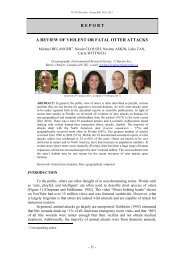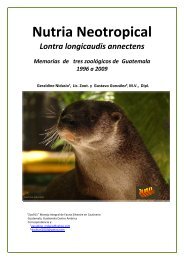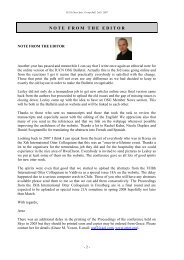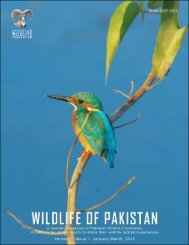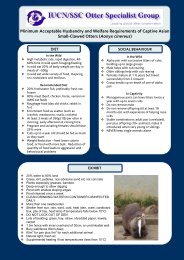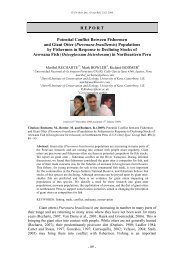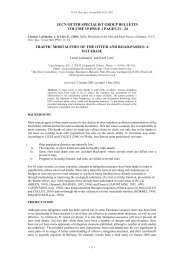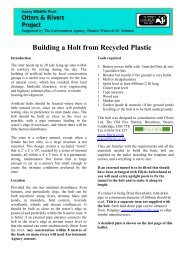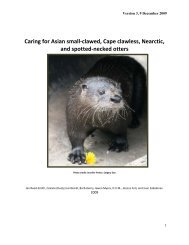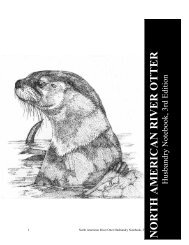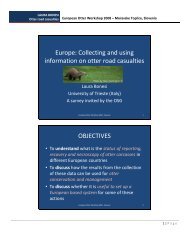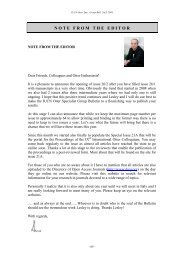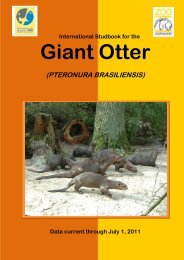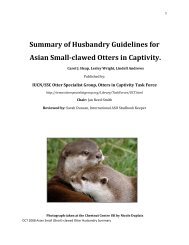Asian Small-Clawed Otter Husbandry Manual (1998)
Asian Small-Clawed Otter Husbandry Manual (1998)
Asian Small-Clawed Otter Husbandry Manual (1998)
Create successful ePaper yourself
Turn your PDF publications into a flip-book with our unique Google optimized e-Paper software.
E. coli mastitis--A rapidly progressive gangrenous mastitis caused by E. coli has been reported in thedomestic ferret. Toxemia occurs, and mortality can be quite high. Early, aggressive therapy involvingampicillin, gentamicin, and surgical excision of the affected mammae has been successful. The diseasehas also been seen in mink. (Bill Wustenberg, pers. comm.)Purulent pleuritis involving several different bacteria has been commonly reported in mustelidsincluding the European badger, mink, and a North American otter. In mink, it is often seen inconjunction with dental disease and severe gingivitis.Other bacterial diseases documented in mustelids include listeriosis, tularemia, pasteurellosis,leptospirosis, salmonellosis, brucellosis, and actinomycosis. The clinical manifestations of thesediseases in mustelids do not vary appreciably from that seen in other carnivores.Mycotic DiseaseFungal diseases have not been frequently reported in mustelids. Dermatomycosis, involvingMicrosporum and Trichophyton, has been reported in mink, domestic ferrets, and otters.Histoplasmosis has been seen in both domestic ferrets and striped skunks. There have been severalcases of cryptococosis in the domestic ferret and one case of blastomycosis. Coccidiomycosis hasbeen described in several North American otters from Arizona. Mucormycosis involving Absidiacorymbifera has caused otitis media and meningoencephalitis in farmed ferrets. This infection is found inconjunction with Otodectes cyanotes. Adiaspiromycosis has been reported in striped skunks andEuropean polecats (Mustela putorius). The disease caused by Emmonsia (formerly Chrysosporiumcrescens), results in varying degrees of pulmonary granulomatous disease and can also involve regionallymph nodes.ParasitesNumerous external and internal parasites have been identified in both wild and captive mustelids. Onlya few will be discussed in this paper.Heartworm disease caused by Dirofilaria immitis has been reported numerous times in the domesticferret. Microfilaremia is an uncommon finding in this species, and antibody testing is unreliable. Mostauthors recommend heartworm preventative for ferrets in heartworm endemic areas. Heartwormdisease has been reported only rarely in other species of mustelids. One adult D. immitis was found ina North American otter from Louisiana, which was not associated with clinical disease. D. immitis wasalso found in a Giant Brazilian otter (Pteronura brasiliensis) in Venezuela and twenty-five adultheartworms along with microfilaremia were found in an aged wolverine from Michigan in 1976.Dirofilaria lutrae has been found in the subcutis and pulmonary arteries of several North Americanotters. It is unclear whether this species of Dirofilaria causes clinical heartworm disease. Until furtherinformation is known regarding the susceptibility of individual species to infection with Dirofilaria, itwould seem prudent to keep valuable mustelids that are housed outside in heartworm endemic areas onpreventative.<strong>Asian</strong> <strong>Small</strong>-<strong>Clawed</strong> <strong>Otter</strong> <strong>Husbandry</strong> <strong>Manual</strong>/Health Care-36-



